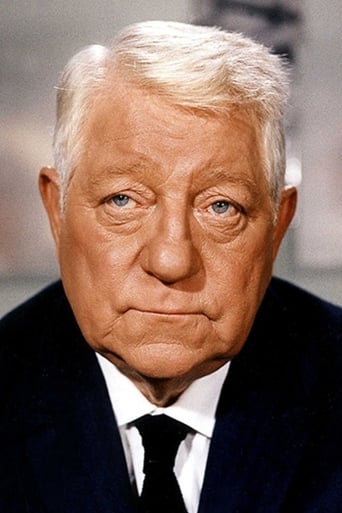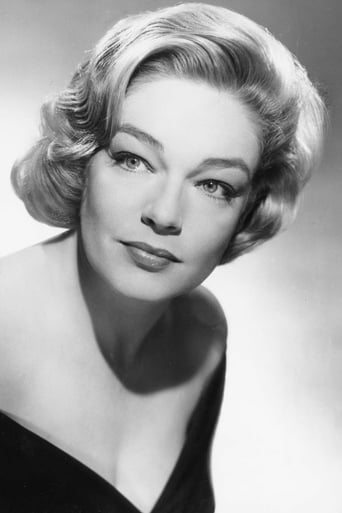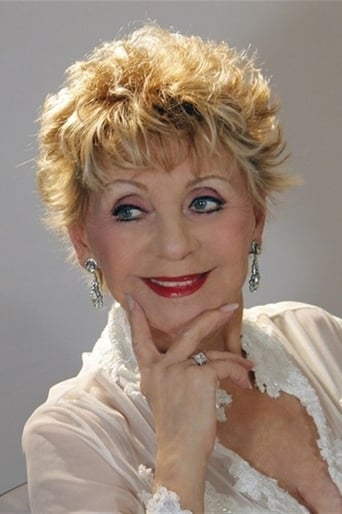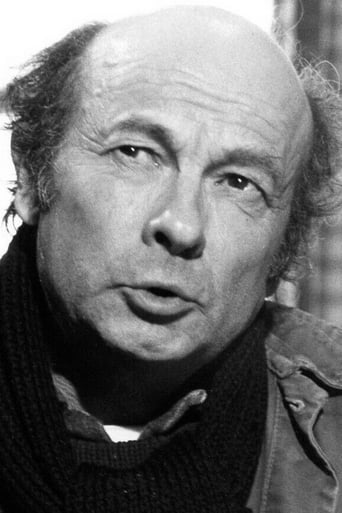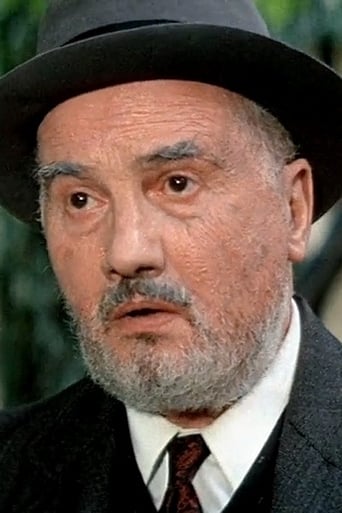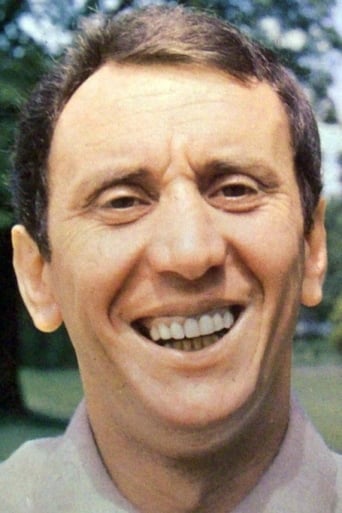ElMaruecan82
Never had silence been as eloquent as in the first act of "The Cat". Most of the exchanges consist on severe glares, desperate stares and a few thrown written notes, but there's a reason why nothing much is said, we don't need words to feel for the characters, nor to understand their opposite needs and motives.So, the minimalism is less an artistic license from director Pierre Granier-Deferre than the authentic, true-to-life translation of marital boredom, carried by two actors who didn't need dialogues to shine: they had faces, and what faces! With the solid and sensitive presence of veteran actor Jean Gabin and blue-eyed Simone Signoret who, at 49, looked ten years older, the hardest part was over. Indeed, seeing these two living monuments, act, react and sometimes, interact, was a soul-haunting spectacle by itself. Yet, quoting Gabin, star-system was over: even his presence of Signoret's wouldn't have been enough to justify a film if there wasn't some reason-to-be.And that's "The Cat"'s offering: a powerful statement about marriage or the effect time has on the life of a former typewriter and an acrobat who had a limp from a youth accident. A few bucolic flashbacks (contrasting with the bleak tone of the first act) show a then-youthful couple that made love on the grass after romantic motorcycle rides, to finally surrender, thirty years later, to routine. It seems that whatever gave a spice to their life has turned sour and the house that was once looking onto a charming neighborhood became the sole survivor of urban expansion, and soon-to-be destroyed by ominous bulldozers. The buildings' destruction is a leitmotif of powerful value; it is not the house but the marriages' foundations that are obviously at stakes. In fact, the whole film is full of metaphorical symbolism, one that never feels forced as it is naturally inserted in the story, starting with the titular animal. The cat is an ordinary alley cat, not ugly but not exceptional either, and as soon as Julien Bouin finds it, it's literally love at first sight: the animal becomes his provider and repository of feelings, much to Lucienne's devastating jealousy. This is a woman abandoned by her husband, they live in the same house, share the same rooms, but they live in separate lives, the cat put the final nail in the coffin of their lost love, that glee in Julien's eyes with the cat on his knees is one she'll never get, and she can't resign herself.In fact, she has nothing against the cat, she even likes it but the poor animal reflects the heart nuisance the marriages turned to, and will trigger the chain of events that will lead to the heartbreaking final act. The film is told in flashback and this is the right choice because it leaves most of the powerful moments near the end so that the cat doesn't steal the actors' thunder. It is just a cause but not an end: the core of the film is the tragedy of a relationship that is so fragile that any blow can make it collapse, but as the story moves forward, we feel that the bigger tragedy is that it never does. Maybe divorces or separations have become such common practices that we can't understand why the two never envisioned that option, it is even questioned in the film when Julien goes to his old mistress, a brothel manager, played by Annie Cordy. And these dialogues with the mistress are integral to the comprehension of Julien's mysterious personality; he has such ugly words about his wife that the mistress doesn't understand why he doesn't leave her. Well, the answer is in the question, Julien can't prevent himself from talking about his wife, she's the center of his thoughts, as mean as they are, at least, they exist. Marriage seems like a plane in a storm, he's aboard and can do nothing about it. But Lucienne needs love and in one of the film's emotional outbursts, she says she wants a cat, too, to get her share of tenderness, and then she starts meowing hysterically, this is how desperate it is. Julien puts the final blow by commenting her awful looks when she's upset.But does he fool us? All through the film, we suspect that his heart is not devoid of feelings, the passion has just been diluted in the disillusion of time and boredom and he can't find a proper way to express it, maybe he doesn't know it himself. The film doesn't really provide answers, it just shows a reality that couples can relate to, even I who's been married for five years contemplate a same sort of existential block sometimes, and being younger than the couple is scarier because I wonder if the film can't work like a warning. But then again, this is not just about marriage but the effect of times on relationships. Julien and Lucienne, as old as they are, used to have dreams, and weren't just blue-collar workers so that life would be ahead of them after retirement, they had interesting jobs and they had no kids. Future couldn't look gloomier.They say marriage is an institution, well the film reminded me of this term coined in "The Shawshank Redemption" : being 'instutionalized', which means getting used to the very walls that used to scare us, because time has a double effect: it erodes relationships, but also build our resistance to their erosion, the tragedy of "The Cat" is that the effect is different from the husband to the wife, but the greatness of the film lies in the final minutes, and the way it toys with the sicknesses of the two leads, that can be both summarized as 'heart' conditions.I'm not sure I'd feel ready to watch "The Cat" again, but I know there will come a time, if I grow old enough, where I'll think about it, again.
Nicholas Rhodes
This is hardly what you would call a film of action, in fact all the director could muster was a couple of shots from a pistol resulting in one dead moggie ! No, it's a film destined to a limited audience, and, even worse, is pessimistic and gloomy. A bit of a shame because Pierre Granier-Deferre has produced some more interesting stuff than this. However, it is watchable if you like the main actors, Jean Gabin and Simone Signoret, which I do. Their performance ( and the cat's ) makes the film just about watchable. Jean Gabin and Simone Signoret's couple has been flagging for a while, he does not love her any more and gives all his affection to this famous cat, whilst SS is getting more and more irate....alors, ce qui devait arriver, arriva .... she shoots the cat ! The gloominess of the film is compounded by the fact that they live in a neighbourhood which is gradually being demolished day by day to make place for high rise blocks, and their old house stands out like a sore thumb amongst the ruins. There is little human dialogue in the film ( but Gabin does seek some solace from a neighbour lady friend ), there is some slow-motion cat dancing on scaffolding and various futile attempts by Signoret to start conversation. In summary, it is well acted, these two are "monstres sacrés" from French cinema so I think the film is worth watching for their performance. If I am not mistaken it was made in the western Paris suburbs, either near Colombes or the Courbevoie/Puteaux area which has been transformed into La Défense business complex. For this reason alone the film is an interesting record of a long demolished area of the Paris suburbs. Also on the positive side, picture and sound quality are excellent.
dbdumonteil
A critic whose name I forgot wrote:"imagine that in "le jour se lève" (1939),Jean Gabin did not die;he would have married Jacqueline Laurent and what would have become of them?Probably what Granier-Deferre shows in his movie (adapted from Georges Simenon)".It's a harsh cruel ruthless effort:daily life ,routine,humdrum,a love worn away by time have destroyed everything."Wounds have burst open,and corridors rust/Once proud and truthful,now humble and bent/Fires which burnt brightly,now energies spent"(Keith Reid) These two former lovers have become the worst enemies;Gabin has transferred his affection to a pet,and Signoret cannot stand it.Around them,wrecking balls are destroying all the old houses,it's a transparent metaphor ;their world is crumbling and they know it.The second part,when Gabin stops talking to his wife and writes her notes to communicate is downright depressing.And however,the ending will show that even after floating on an ocean of mud,love ,or something which looks like love, survives.
